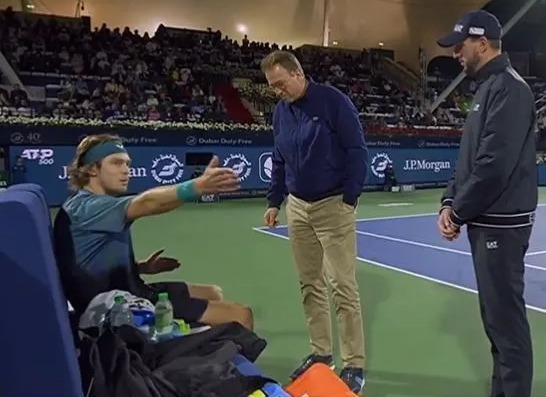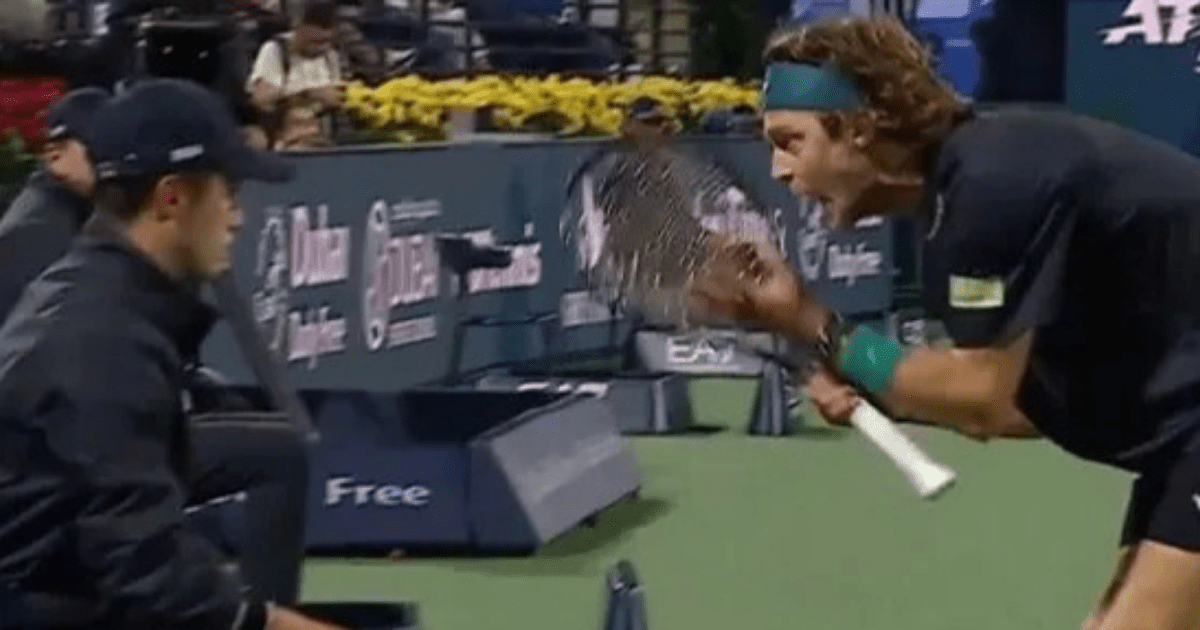Fuming Outburst Leads to Shocking Disqualification
Temperatures soared at the Dubai Open as tennis star Andrey Rublev was disqualified from his match after a heated confrontation with a line judge. The Russian player vehemently denied using foul language, with opponent Alexander Bublik standing by his side.
Denial and Disqualification
Andrey Rublev, ranked World No5, found himself trailing 6-5 in the final set when he exploded at a line judge over a disputed call. Despite denying the use of profanity and insisting he spoke in English, Rublev was ultimately disqualified by umpire Miriam Bley.
Opponent's Support and Crowd Reaction
Surprisingly, Rublev's opponent, Alexander Bublik, supported his claim of innocence, stating his willingness to continue the match. The decision to default Rublev led to a mix of reactions from the crowd, with some expressing disappointment over the outcome.
Social Media Buzz
Following the incident, social media lit up with fans expressing their opinions on the controversial disqualification. While some criticized Rublev's behavior, others questioned the fairness of the ruling based on uninvolved parties' accusations.

Looking Ahead
This turn of events at the Dubai Open marks a turbulent chapter for Andrey Rublev, who recently reached the quarter-finals at the Australian Open. The disqualification has left fans and critics alike pondering the future implications for the talented player.
Frequently Asked Questions
How does mental and psycho-social training affect tennis training?
Tennis players need to be trained in mental and emotional training just as much as they do physical training. Tennis players must learn how to handle stress, focus and the emotional highs or lows that come with competition. Common practices include visualization, goal-setting, mental rehearsals and goal-setting. Sports psychologists can help athletes build resilience and develop coping mechanisms for stressful situations. They can also improve their mental game in order to match their physical ability on the court.
What type of support team is needed by a top-level tennis player?
To be able to compete on the highest levels, top tennis players require a team of support. This team includes a coach who oversees training and technical improvement, as well as a fitness instructor for physical conditioning. A physiotherapist, medical professional, or sports psychologist will also be part of this team to provide mental coaching. A hitting partner, a manager or agent, and sometimes a stringer can also be part of the team, ensuring the player can solely focus on their game.
How important are junior tennis tournaments in a career of professional tennis?
Junior tournaments are a vital step on the road to a tennis professional career. These tournaments provide young athletes with the opportunity to test their skills against their peers, gain valuable match experience, and learn to cope with the psychological demands of competitive play. These tournaments can also be a stepping-stone to higher level competitions, as well as impacting a player’s ranking, visibility with coaches and sponsors and overall development.
What type fitness training is most important for tennis athletes?
Tennis is an intense sport that demands a combination aerobic endurance, anaerobic strength and power, as well as speed. Fitness training for tennis players often encompasses cardiovascular exercises to improve endurance, plyometric and explosive exercises for speed and power, weight training for strength, as well as agility drills to enhance footwork and on-court movement. Exercises that improve core stability and balance are essential to building the endurance and coordination needed for tennis.
How does a tennis player manage school and training?
It is difficult for tennis players to balance their academic obligations with intense training schedules. Time management, prioritization skills and sometimes creative scheduling are required. Online learning and flexible academic programmes can help young athletes accommodate their demanding training schedules and travel plans. Families, coaches and educational institutions can also play a vital role in helping athletes achieve their athletic goals without compromising their studies.
Statistics
- Engaging in structured video analysis sessions has been shown to improve a player’s tactical decision-making by approximately 35%.
- Top tennis players typically train for 4 to 6 hours per day, divided between on-court practice and fitness training.
- Nutritionists report that a tennis player’s diet should consist of about 55-60% carbohydrates, 15-20% protein, and 20-25% fats during intense training periods.
- Research indicates that junior tennis players who compete in international tournaments gain significant psychological advantage and experience, with participation leading to a 50% better transition into professional rankings.
- Strength and conditioning coaches emphasize core strength, noting that an increase in core stability can improve shot accuracy by up to 43%.
External Links
myprocoach.net
itftennis.com
essentialtennis.com
topendsports.com
atptour.com
How To
Tennis Footwork & Court Movement: Master the Art!
Mastering your tennis footwork starts with conditioning. To improve your lateral, linear and squat movements, incorporate agility exercises such as ladder drills or cone drills in your routine. Split stepping, a short hop done as the opponent hits a ball, will allow you to move into your next position quickly. Incorporate dynamic drills to help you recover more quickly after every shot. Develop a focus on balance and coordination exercises. Finally, in match play be aware of the way you move, and give yourself plenty of time to strike each ball comfortably.

